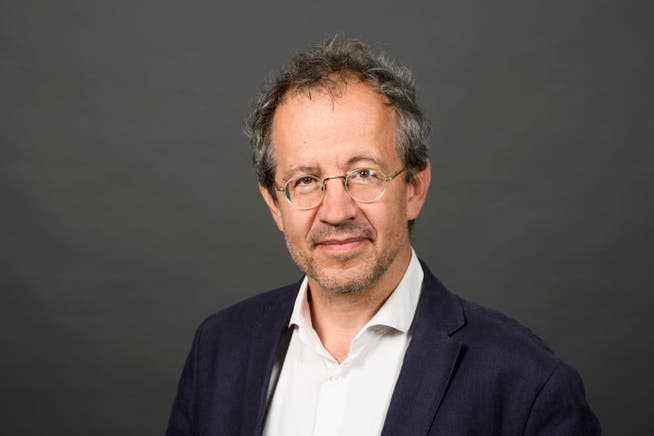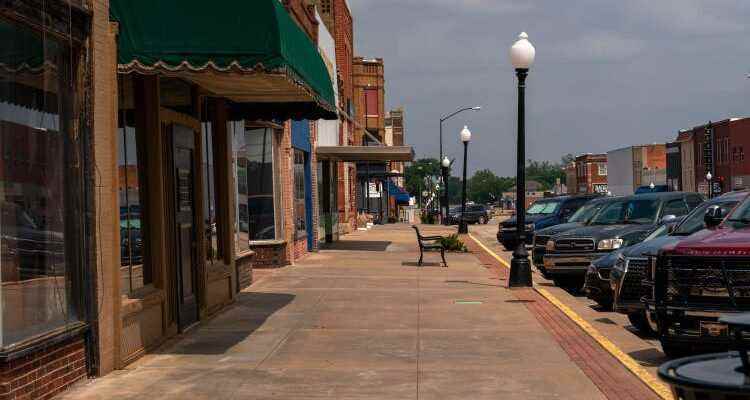Researching fracking in Oklahoma is difficult. Interview requests from companies remain unanswered, politicians disappear, those affected briefly open the door and then close it again. After all, the reporter is invited to a tornado shelter.
A commercial street in Cushing. The economy here lives on oil.
Knowledge is important in journalism; but even more important is ignorance. Especially when it comes to a controversial reporting topic like fracking, I naturally read as much as possible beforehand, but then try to forget everything before the actual trip and start again from scratch. Only in this way is it possible to meet the conversation partners without prejudice and to listen carefully.
When the communications departments don’t communicate
This time, however, the process proved difficult because there was no one to listen. Because of the widespread criticism of fracking, it was important to me to talk to company representatives and hear their perspectives; but most didn’t even reply to the inquiries, only a few bothered to wave them off. One company replied that they would not have time for the next two weeks. When I suggested an interview in three weeks, no answer came. The same with a press officer who said a site visit was not possible. When I suggested a Zoom call instead, she fell silent, too.
I made a second attempt by texting everyone again. I grabbed the bull by the horns, I thought. In a more detailed e-mail than the first time, I explained that – with all the negative publicity – I naturally understand the caution towards the media, but I’m not interested in ready-made dismissal, but rather in researching with an open-ended result. I also took the liberty of pointing out to them that their crushing strategy is inevitably pushing journalists into the army of anti-fracking activists. But it was all to no avail, they continued to refuse any communication.
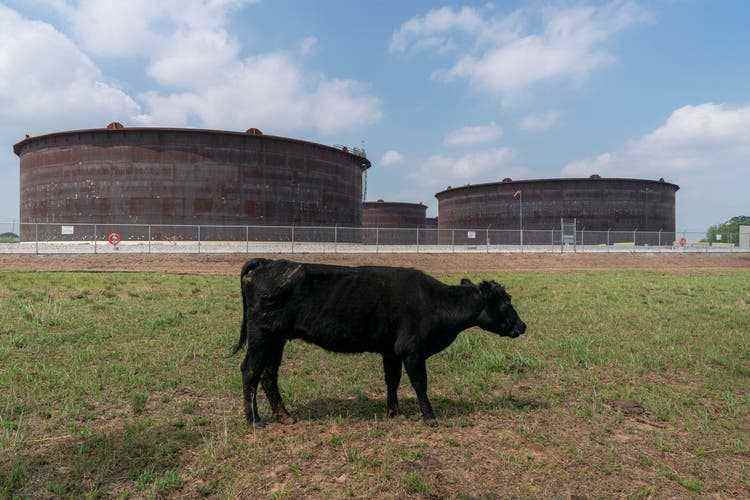
A cow grazes in front of a huge oil reservoir near Cushing.
There are no problems – but she doesn’t want to say anything
So I ended up with Ariel Ross from the NGO Stop Fracking Payne County and decided to meet her in Stillwater, Oklahoma. She was more than willing to show me around. It also turned out that you didn’t actually have to go through a company to visit the fracking and drilling sites. They were mostly small, only protected by a fence and deserted. It was no problem having Oklahoma photographer Nick Oxford, who has extensive experience in the oil industry, to photograph the facilities while Ariel Ross explained the ins and outs.
However, that does not make a report. There were cottages right next to one of the drilling sites, which had apparently lost their market value due to fracking and oil production. After a long knock, a door opened. A young woman stuck her head out sleepily. It was about eleven in the morning. No, there have never been any problems, she said. No earthquakes, no stench, no pollution. But she doesn’t want to talk to journalists. a photo? “No way!” and the door was closed again.
This was repeated two or three more times, which is rather unusual in the US, where people are generally open and talkative – except for militant Trump supporters when they feel they are dealing with a left-wing representative of the mainstream lying press . But here you might have thought you were dealing with the impenetrable Omertà during a mafia investigation in Sicily.
They photographed our license plates
In the meantime a few men had appeared. While we were doing the rounds, they took a picture of our car’s license plate and then disappeared. Deciding to turn the tables, we entered the company’s premises, introduced ourselves and asked if they could show us around a bit. To our surprise, one of the men, an engineer, actually agreed. He didn’t want to give his name and photos weren’t possible either, but still.
He also pointed out a man nearby who was disposing of contaminated borehole sewage by spouting it back into the ground. He turned out to be straightforward and friendly. A down-to-earth guy, forty years in the oil business; Certainly a hard-nosed Republican, but the old, backslapping sort who liked to talk about the old days when you could still live free and uncomplicated.
“They climbed over the fence!”
In Stillwater, I called the mayor’s secretary to set up an interview. However, she brushed me off by saying that I should rather interview the Cushing city manager. “There are all the tanks and pipelines there.” That was true – the largest oil reserves in the USA are stored in Cushing – but actually I wasn’t interested in reporting on tanks. Nevertheless I tried my luck. But again I was put off until tomorrow, and then again until tomorrow and so on.
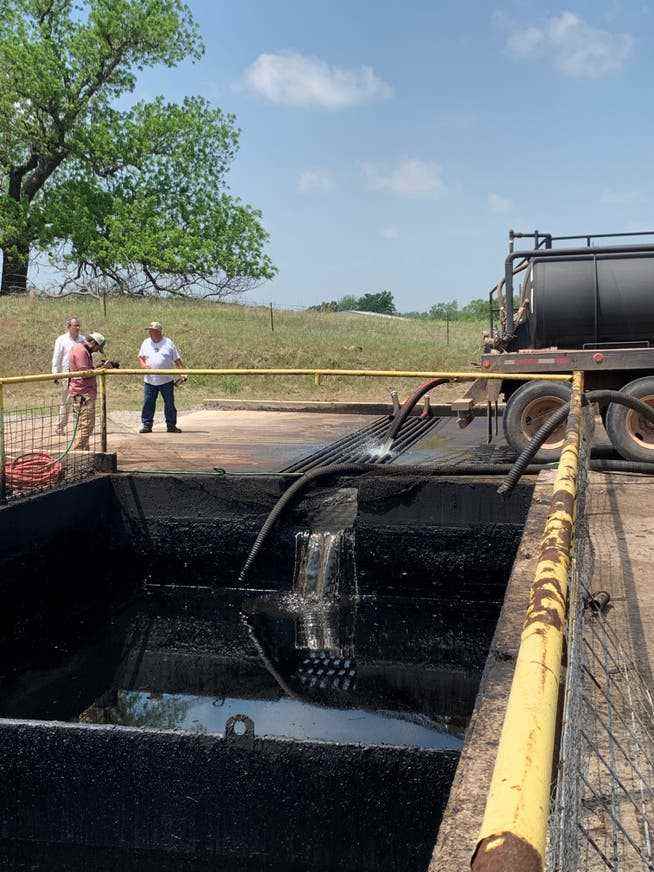
Correspondent David Signer and photographer Nick Oxford join David Willman to tour a water treatment plant in Oklahoma.
We stopped at Cushing’s impressive, endless line of tanks and Nick climbed onto the roof of the car to take some pictures. We then knocked again on the door of a local resident, who said the oil company’s surveillance drones were constantly circling overhead, even during their backyard barbecues. Suddenly a huge pick-up truck approached, a giant man at the wheel yelled for us to come here. He claimed an employee informed him that Nick had tried to climb over the fence to take photos. When we denied, he asked what we were even doing here. Nick explained that we were from the press and that it was legal in the land of the free to take pictures from public ground.
“The usual intimidations,” Nick said afterwards. “Every time the same.” When we got back to the local resident, she didn’t want to talk to us anymore. “I don’t want any trouble,” she said. After all, she referred us to her parents who lived nearby.
A surprising contact
When we knocked there, the man was highly suspicious, even hostile, while the woman was at least curious as to how we knew her name. The man apparently had a fixed image of what dubious people journalists and photographers are: left-wing, green, possibly gay, probably from New York, drink wine instead of beer, espresso instead of American coffee and probably can’t even handle a chainsaw.
The mood brightened when it became clear that Nick is from Oklahoma and that I appear to be an even bigger hillbilly who can’t even speak proper English and has no idea about anything, but at least shows genuine interest and asks respectful questions. In the end he didn’t invite us into the house, but he offered us a chair in front of the front door.
That evening, Nick had already left, I was sitting over my notes in a café in Stillwater when the phone rang. It was Ariel Ross. She had just spoken to a man well versed in fracking who was willing to meet me. I called him and we agreed that he would pick me up in an hour. He was a man in his forties who lived alone in a shabby, isolated house. Apparently fate played badly on him: job gone, money gone, wife gone. Like many somewhat lonely people, he had an enormous need to communicate and talked constantly.
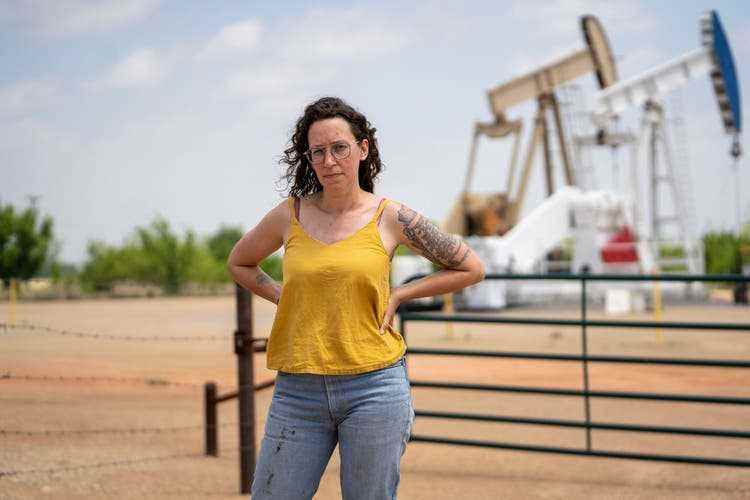
Ariel Ross of the NGO Stop Fracking Payne County.
Infected with paranoia
On the lawn in front of the house, he showed me his tornado shelter, which had cracked due to fracking nearby and water was now seeping in. He opened the trapdoor, I looked down, and he said, “You can go down the ladder.” At that moment, I suddenly felt eerie. I imagined him then locking the door and holding me down there. I gratefully declined the offer and said a little later that I would like to drive slowly back to the city.
“Of course,” he said, “you’re not my prisoner.” This reminded me of a famous Freud passage: A patient tells him a dream; Freud asks who the woman in the dream is, the patient says: “Well, it definitely wasn’t the mother.” To which Freud replies: “So it was the mother.” In other words: the keyword “prisoner” obviously also went through my interlocutor’s head, albeit in the form of a negative.
But maybe I was just exhausted and a bit confused after the long, tiring day. He drove me back to Stillwater.
The next day, while I was already in Tulsa to write about the new Bob Dylan Center, the secretaries of both the Mayor of Stillwater and the Cushing City Manager called me; both invited me to come by for a chat. I assume because they found out that I had left and that a visit was no longer possible.
